2010
January – March, Greece: The socialist PASOK Government announces two rounds of austerity measures and cuts, and faces mass protests and strikes. Greece’s credit rating is downgraded by one of world’s three leading rating agencies amid fears the government could default on its ballooning debt.
January, USA: HIV infection is dropped from the list of communicable diseases of public health significance by the DHHS, Centers for Disease Control and Prevention.
January, UAE: Burj Khalifa, world’s tallest building at 829.8 m (2,722 ft), officially opens in Dubai
On 12th January Earthquake devastates Haiti, killing approximately 222,000, it was among the deadliest earthquakes on record
January, Global: Longest solar eclipse of the 3rd millennium occurs. With duration of 11 minutes and eight seconds, it was the longest eclipse of this millennium. The next eclipse of a longer duration will occur December 3034.
April, USA: The worst marine environmental disaster in US history. Deepwater Horizon drilling platform exploded in the Gulf of Mexico, killing 11 workers and injuring 16 others. It is the second largest environmental disaster in American history.
April to May, Greece: Fears of a default on Greece’s debts prompt eurozone countries to approve a $USD145 bn (110 bn euros) rescue package, in return for a round of more stringent austerity measures. Trade unions call a general strike.
May, USA: The first artificial life-form was created by scientists, led by Dr Craig Venter. Mycoplasma laboratorium was a new species of bacterium, with man-made genetic code, originating on a computer and placed on a synthetic chromosome inside an empty cell.
June, Australia: Julia Gillard becomes Prime Minister, ousting Kevin Rudd in a Labor Party leadership challenge. In August, parliamentary elections fail to deliver a clear winner. Prime Minister Gillard clings to power after securing support of independents to form a minority government.
June, USA: Apple debuts the iPad – a device between a smartphone and laptop computer.
July, Pakistan: The worst floods in modern history. Approximately one-fifth of the country was underwater. The floods directly affected nearly 20 million people.
July, Japan: Interplanetary Kite-craft Accelerated by Radiation Of Sun (IKAROS) was a Japanese experimental spacecraft was the first spacecraft to successfully demonstrate solar-sail technology. Its membrane (kite) had a diagonal span of 20m, but a thickness of just 0.0075mm.
December, Greece: Onassis Cultural Centre, Stegi (meaning roof) opens in Athens as a modern cultural landmark. It covers an entire block of Syngrou Avenue. Architecture Studio’s design is a glass cube cloaked in rows of white marble that glow at night.
2011
February, Greece/USA: The first Academy Award nomination for Dogtooth by Georgios “Yorgos” Lanthimos (b.1973), for Best Original Screenplay in the Best Foreign Language Film category. Dogtooth is a 2009 dark comedy about a dysfunctional couple and their adolescent son and two adolescent daughters, who all live in a fenced compound. The children have no knowledge of the outside world and their parents say they will be ready to leave once they lose a dogtooth.
March, Japan: Massive Earthquake 9.0-magnitude and subsequent Tsunami hit the east of Japan, killing nearly 16,000 and leaving another 2,600 missing.
March-June, Greece: The economic crisis in Greece reaches breaking point. The EU allowes Greece to borrow from other European countries as well as the International Monetary Fund (IMF), in the largest bailout package in recent history. Greece is forced to drastically cut back its spending. Corruption, increases in taxes, and cuts to public social programs result in widespread civil unrest. The country has run up massive deficit, an estimated 13.6% by 2010. A level of deficit spending well outside the EU’s economic regulations. Greece misreports its official financial statistics. The government has paid hundreds of millions of dollars to Goldman Sachs, to have them initiate baseless financial transactions that would hide the true level of spending and debt. Greece begins to collapse under crushing debts, at 20% larger than the entire economy and estimated or USD$410 billion. Greek banks had borrowed vast amounts making the problem worse. They were now charging the nation higher rates when it tried to borrow more. Greece was downgraded to the lowest credit rating in the eurozone. The country almost becomes a financial black hole.
May, USA/Pakistan: Osama bin Laden killed by a team US commandos a the green-light by US President Barack Obama. Following the attacks of 9/11, Osama bin Laden becomes the most internationally hunted fugitive in history. CIA located bin Laden’s compound in Abbottabad, Pakistan and launched a night raid by 79 Navy SEAL commandos.
June, Greece: 24-hour general strike. Tens of thousands of protesters march on parliament to oppose government efforts to pass new austerity laws.
June, EU/Sweden: The world’s first synthetic organ transplant is successfully carried out in Sweden. A 36-year-old man, suffering from terminal cancer of the trachea, receives a new replacement windpipe. A nanotechnology scaffold is made from spongy, flexible polymer and then seeded with the patient’s stem cells in a bioreactor.
July, Greece: European Union leaders agree on another major bailout for Greece over its debt crisis by channelling 109bn euros through the European Financial Stability Facility. All three main credit ratings agencies cut Greece’s rating to a level associated with a substantial risk of default.
July, South Sudan: South Sudan is born as a nation following decades of conflict with the north, in which 1.5 million people died. South Sudan splits from Sudan, becoming the 193rd country recognised by the UN and the 54th member state in Africa.
October, Global: Population reaches 7 billion, over 74 million people were now being added to the world each year.
October, Greece: Eurozone leaders agree a 50% debt write-off for Greece in return for further austerity measures. PM George Papandreou puts the deal in doubt by announcing a referendum on the rescue package.
November, Greece: Faced with a storm of criticism over his referendum plan, Mr Papandreou withdraws it and announces his resignation. Lucas Papademos, a former head of the Bank of Greece, becomes interim prime minister of a New Democracy/PASOK coalition with the task of getting the country back on track in time for elections scheduled provisionally for the spring of 2012.
December, Australia: Australian Economy grows unexpectedly fast in the third quarter of 2011, driven by construction and mining. GDP rose 2.5% on the year, whereas analysts had expected 2.1%.
2012
January, China: Three Gorges Dam, the largest power plant ever built, is finally fully operational. It has been in planning for nearly a century, and costs almost $30 billion.
February, Greece: Against a background of violent protests on the streets of Athens, the Greek parliament approves a new package of tough austerity measures agreed with the EU as the price of a 130bn euro bailout.
March, Greece: The nation reaches a “debt swap” deal with its private-sector lenders, enabling it to halve its massive debt load.
May, Greece: Support for coalition parties New Democracy and PASOK slump, with a increase in support for anti-austerity parties of the far left and right. The three top-ranking parties fail to form a working coalition and President Papoulias calls fresh elections for 17 June
June, Greece: New Democracy wins, albeit without a majority. Leader Antonis Samaras assembles a coalition with third-placed PASOK and smaller groups to pursue the austerity programme.
June, Greece: Far-right party, Golden Dawn, wins 18 parliamentary seats in the June election with a campaign openly hostile to illegal immigrants and there are now allegations that some Greek police are supporting the party.

September, Greece: Trade unions stage 24-hour general strike against government austerity measures. Police fire tear gas to disperse anarchist rally outside parliament.
October, Greece: Parliament passes a 13.5bn-euro austerity plan aimed at securing the next round of EU and IMF bailout loans; the package – the fourth in three years – includes tax rises and pension cuts.
November, USA: Mars Science Laboratory, Curiosity, was launched. It is by far the largest and most powerful rover ever sent to Mars. Among its many instruments were the first video camera taken to another planet.
November, PRC: Xi Jiping becomes China’s paramount leader — launches sweeping anti-corruption crackdowns against senior politicians while asserting himself on the world stage.
2013
January, Greece: Unemployment rises to 26.8% – the highest rate in the EU.
February, North Korea: Underground nuclear test, showed a nuclear bomb signature, magnitude 4.9 (later revised to 5.1), detected by the China Earthquake Networks Centre.
February, Russia: Meteor explodes over the Chelyabinsk. Estimated to have been moving at 18 km/s (40,000 mph or 64,000 km/h), or about 50 times the speed of sound, the object quickly became a superbolide – brighter than the Sun from up to 62 miles away.
April, Greece: Youth unemployment climbs to 60%.
April, USA: Twin bomb blasts targeting the Boston marathon kill three people and injure more than 170. Islamic extremist Dzhokhar Tsarnaev is charged after a manhunt in which his elder brother and suspected co-conspirator Tamerlan is killed.
May, USA: The first creation of human embryonic stem cells by cloning. Scientists at Oregon Health & Science University and Oregon National Primate Research Centre (ONPRC) reprogrammed human skin cells to become embryonic stem cells, capable of transforming into any other cell type in the body.
June, USA: Massive NSA leak revealing operational details regarding the U.S. National Security Agency (NSA) and its mass surveillance of citizens. The majority of these reports emerged from a cache of top-secret documents leaked by ex-NSA contractor Edward Snowden.
June, Greece: State broadcaster ERT is suspended in effort to save money by Antonis Samaras’ conservative New Democracy Coalition Government.
June, PRC: China overtakes the USA in scientific research. Papers have being published at an accelerating rate as millions more students enter universities. In 2013, as even the United States fell behind China.
June, Australia: Former PM Kevin Rudd oust Julia Gillard as Labor leader and prime minister in a parliamentary party vote, after months of infighting.
July, Australia: Off Shore Processing of refugees in PNG, Prime Minister Rudd reaches deal with Papua New Guinea allowing it to ship asylum seekers arriving by boat onwards to its Pacific neighbour.
July, USA: The first gene therapy in the Western world by identifying and “editing” faulty genes within a person’s cells, every disease could in theory be overcome.
August, USA: Voyager 1 crosses the heliopause and entered interstellar. This had been expected to happen in 2015. Voyager I crosses the heliopause, launched in 1977, Voyager I’s original mission was to visit the gas giants of Jupiter and Saturn.
September, Greece: Crackdown on far right, Golden Dawn party and its leader Nikolaos Michaloliakos and five other Golden Dawn MPs are arrested on charges including assault, money laundering and belonging to a criminal organisation.
September, Global: Mayan calendar reaches the end of its current cycle. The Mayans, who lived thousands of years ago in Central America, had developed the only fully written language of the pre-Columbian Americas – as well as its art, architecture, mathematical and astronomical systems. The Mayans used a Long Count calendar. A b’ak’tun was the longest unit of measurement in this system and was equivalent to 144,000 days (394 years).
September, Australia: Tony Abbott wins as new PM leads Liberal-National Coalition in landslide victory against the Labor Party.
October, Australia: Government adopts a new policy of turning back naval vessels of refugees and directing them back to Indonesia, this results in a dramatic reduction in arrivals.
December, Greece: The 2014 budget is passed by the Parliament and it is predicated on a return to growth after six years of deep recession. Prime New Democracy Prime Minister Samaras hails is as the first decisive step towards exiting the bailout.
2014
February, Greece: Unemployment at record high of 28%.
March, Greece: Parliament approves a big reform package that will open more retail sectors to competition, as part of a deal between Greece and its international lenders.
April, Greece: An 8bn euros Greek bailout is released by eurozone finance ministers.
April, Greece: 4bn USD is raised from world financial markets in Greece’s first sale of long-term government bonds in four years, this is an important step in the country’s economic recovery.
May, Greece: Radical leftist Syriza coalition wins the European election with 26.6% of the vote.
May, Great Britain: First same sex marriage are held in England and Wales
June- July, Brazil: The FIFA World Cup is held in Brazil for the first time.
100th anniversary of World War I – No living veterans from that conflict remain, the last survivor passed away in 2012.
September, Australia: The nation’s biggest ever counter-terrorism raids, with 15 arrests in Sydney and Brisbane, sparked by intelligence reports that Islamic extremists were planning random killings.
December, Australia: Islamist Man Haron Monis takes 18 people hostage in Sydney cafe; two hostages and gunman die when police storm premises.
December, Greece: The Parliament’s failure to elect a new president sparks a political crisis and prompts early elections.
2015
January, Greece: Alexis Tsipras of Syriza becomes Prime Minister of Greece after winning parliamentary elections, and forms a coalition with the nationalist Independent Greeks party.
February, Greece: Syriza government negotiates a four-month extension to Greece’s bailout in return for dropping key anti-austerity measures and undertaking a eurozone-approved reform programme.
May, Greece/France: The Lobster receives Jury Prize, Palme d’Or, at the Cannes Film Festival. The film is an absurdist dystopian black comedy by Yorgos Lanthimos. The plot revolves around single people who are given 45 days to find a romantic partner or otherwise be turned into animals. It stars Colin Farrell and Rachel Weisz. The film is a co-production by Ireland, the United Kingdom, Greece, France, and the Netherlands. The film was nominated for Best Original Screenplay at the 89th Academy Awards and for Outstanding British Film at the 69th British Academy Film Awards.
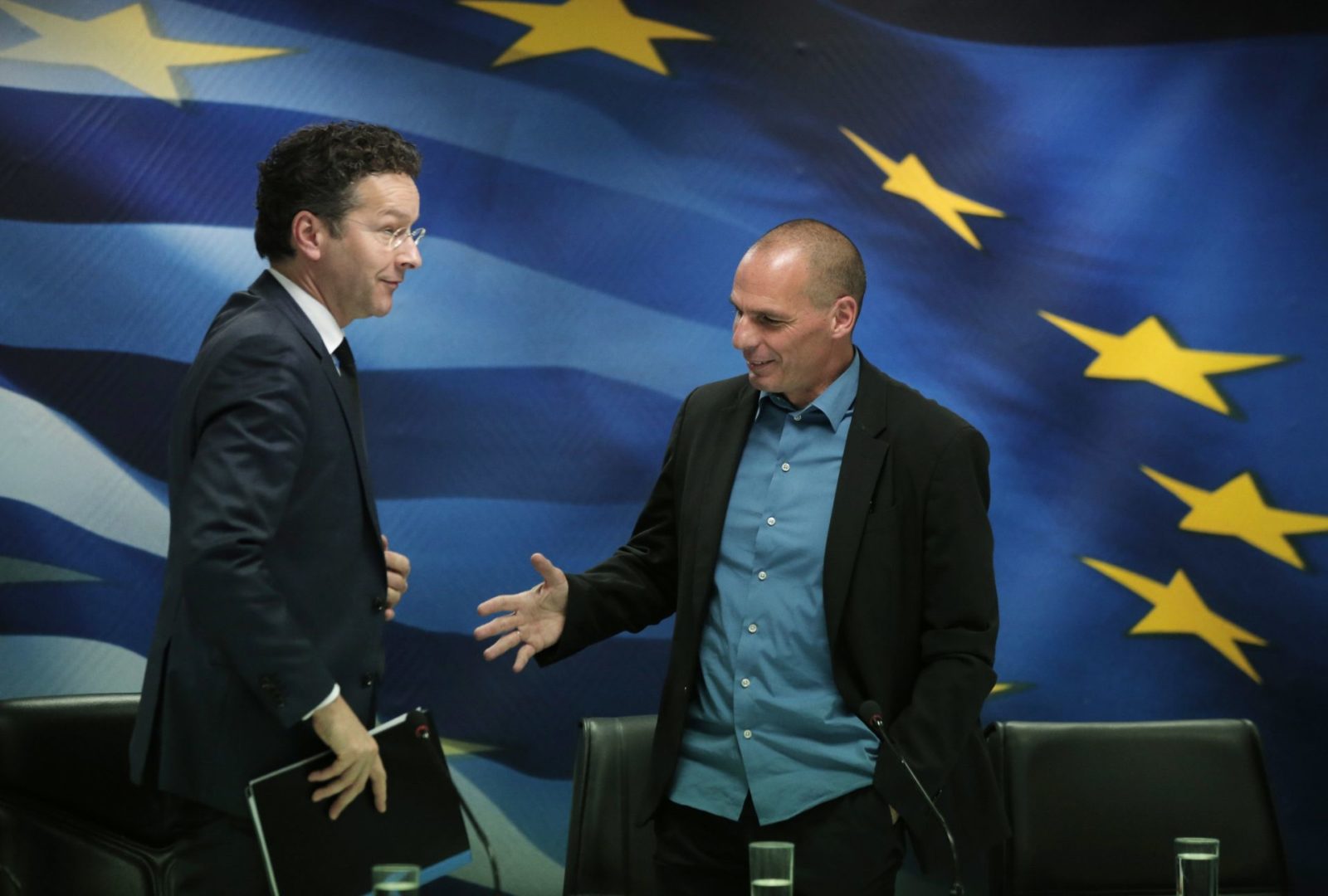
Greece's Finance Minister Yanis Varoufakis, right, reaches out to shake hands with Dutch Finance Minister and Eurogroup President Jeroen Dijsselbloem in 2015. Photo: AAP via AP
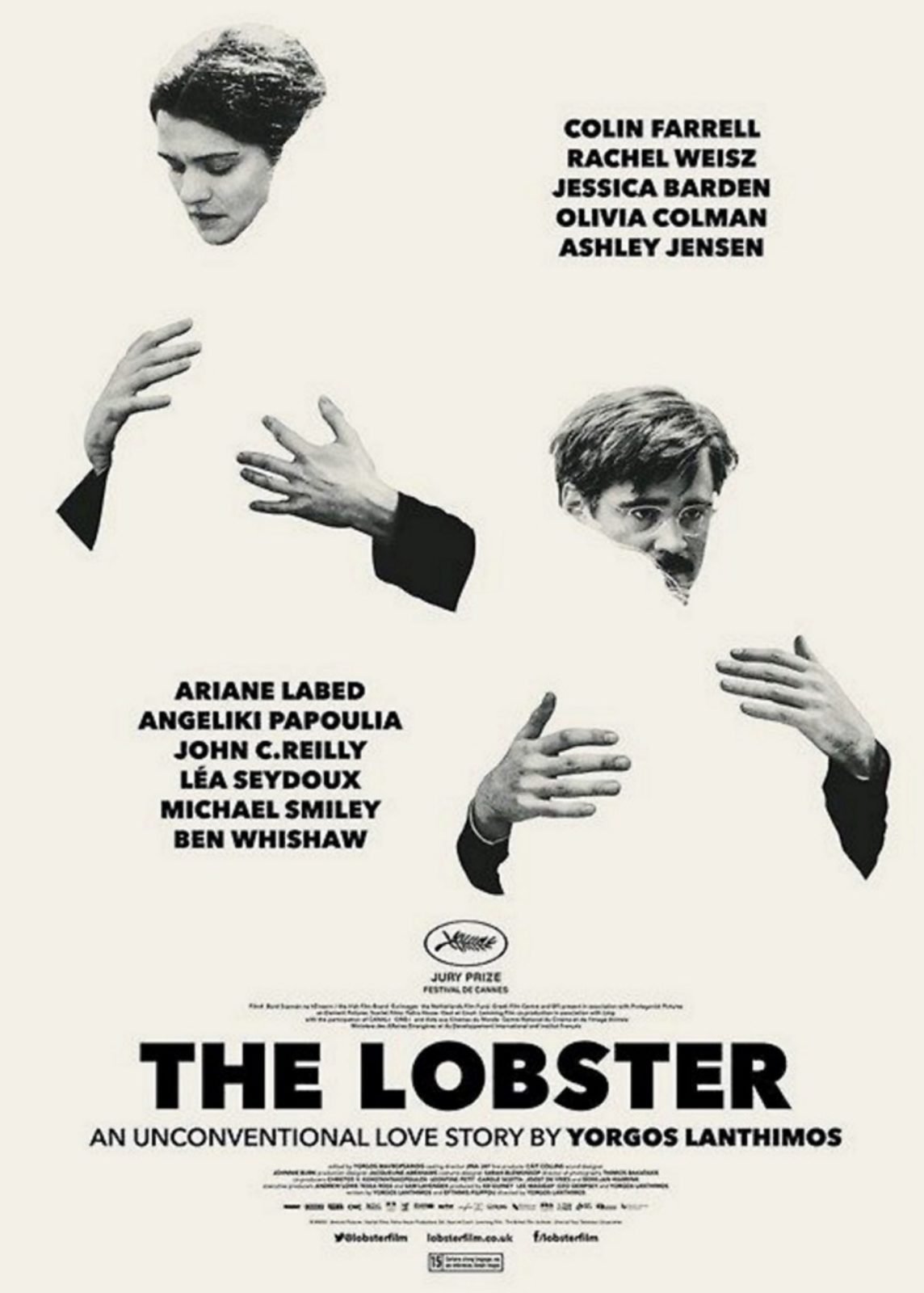
Everybody talked about Lanthimos' film 'The Lobster' in 2015.
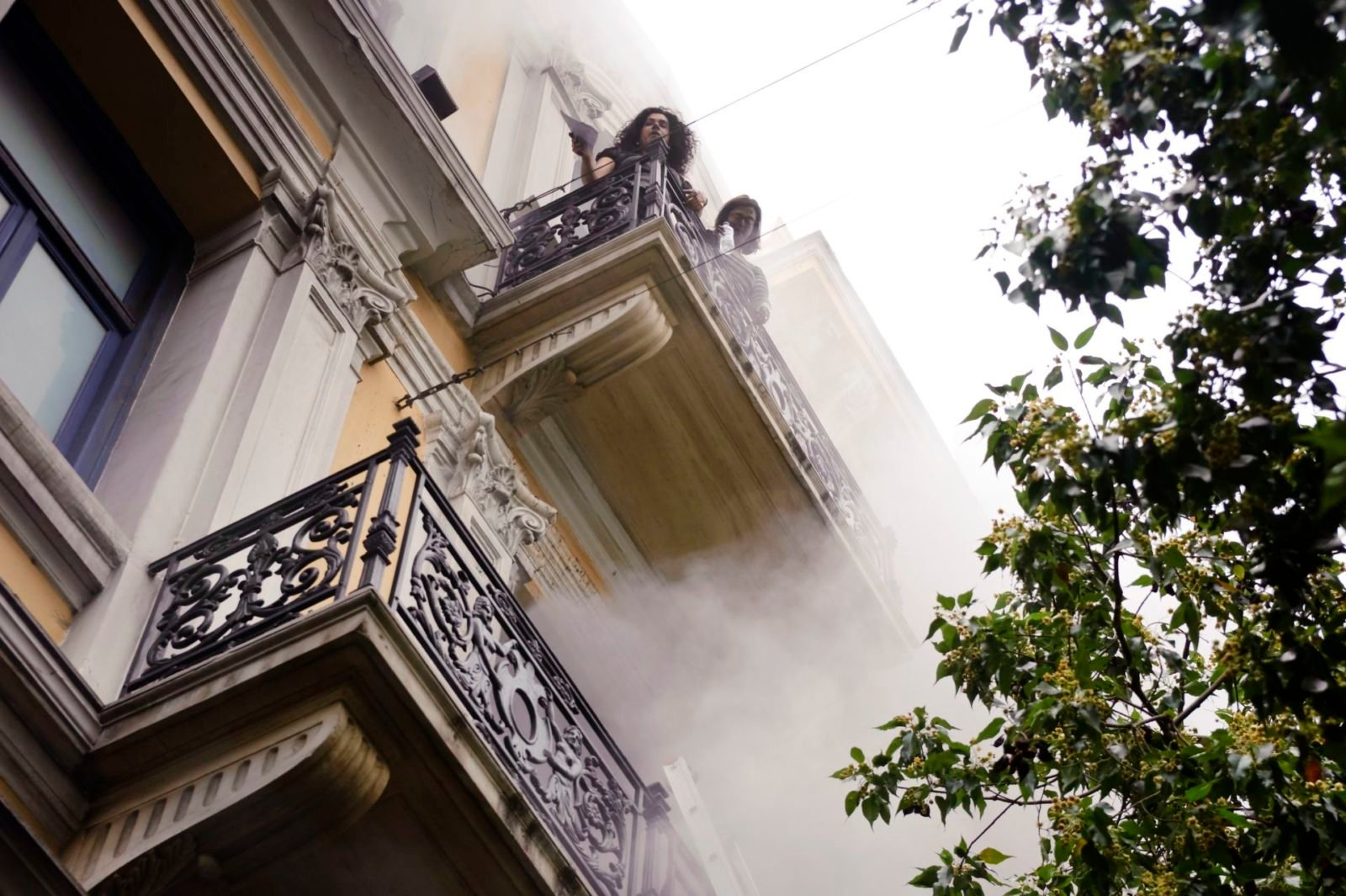
Bank employees, trapped by fire, look over the balcony ledge during an anti-government protest in central Athens, Wednesday, 5 May 5, 2010. Photo: AAP via AP
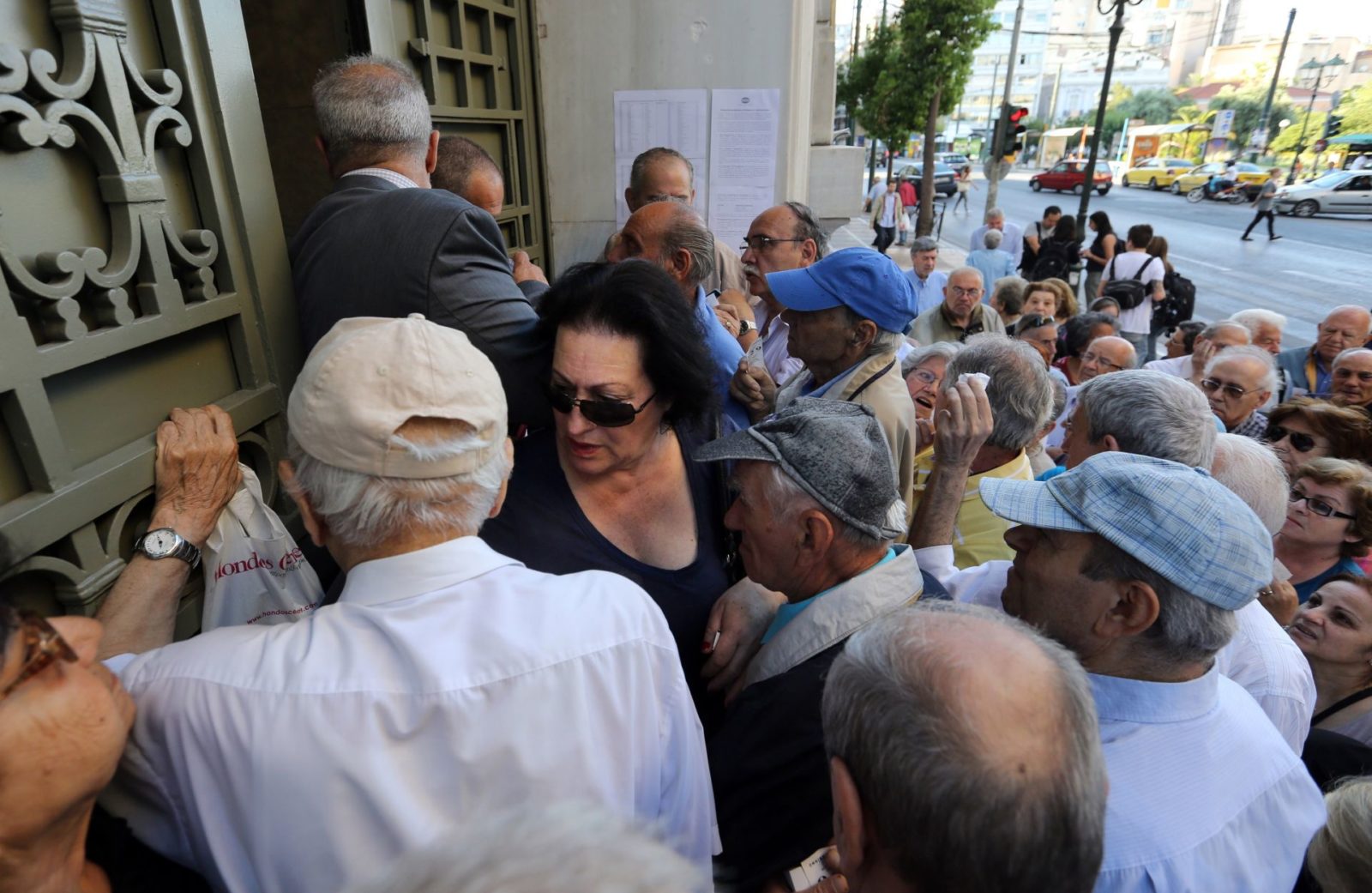
Worried pensioners enter into a bank in Athens, Greece on 1 July, 2015, after Greece became the first developed economy to miss an IMF payment. Photo: AAP via AP
June, Australia: A 20-year plan to develop the infrastructure of the north, including transport and water resources.
June-July, Greece: European Central Bank ends emergency funding. Greece closes banks, and imposes capital controls.
July, Greece: Voters reject EU bailout terms overwhelmingly in July referendum.
August, Greece: Creditors agree with Greece on a third bailout worth 86bn euros, imposing further spending cuts on the country to avoid bankruptcy and exit from the eurozone.
August, EU: Switzerland, Large Hadron Collider (LHC), the world’s largest and highest-energy particle accelerator, reaches its maximum operating power. By smashing together sub-atomic particles at close to the speed of light, it aims to recreate the conditions that existed just a fraction of a second after the birth of the universe.
September, Australia: Malcolm Turnbull replaces Tony Abbott as the 29th Prime Minister after a successful Liberal Party leadership challenge.
2016
Greece: The Stavros Niarchos Foundation Cultural Center a complex in the bay of Faliro in Athens includes the National Library of Greece and the Greek National Opera, as well as the 210,000 m² Stavros Niarchos Park. The Centre was designed by world famous architect Renzo Piano and its construction was funded by the Stavros Niarchos Foundation at a mere 566 euro million (USD$627,200,000) and was donated to the Greek state in 2017.
January, GB/USA: Singer, songwriter and actor David Bowie 69 dies at his Lafayette Street home in New York City, having suffered from liver cancer for 18 months, two days after the release of his twenty-fifth studio album, Blackstar. Bowie’s impact on music, fashion and culture gave him the status as one of the most influential musical artists of all time.
January-March, Greeece/PRC: China takes control of Piraeus as shipping firm Cosco purchases a majority stake in the port.
January, Australia: LNP retains government with the narrowest of majorities in the Federal Election.
March, Greece: Republic of North Macedonia closes its border with Greece to migrants, leaving thousands of people stranded at the Greek border village of Idomeni.
May, France/Greece: Prix Jardin d’Europe goes to Katerina Andreou, choreographer and dancer, for A Kind of Fierce performance in France, Germany and America.
May, Greece: Refugee crisis unfolds in Idomeni refugee camp which faces deteriorating conditions prompting government to evacuate the camp and transfer its occupants to purpose-built processing facilities near Greece’s second city, Thessaloniki.
June-July, Greece: Eurozone finance ministers release a further 10.3bn euros in loans – Athens needs it to meet debt repayments due in July. They also agree on debt relief for Greece, and capping interest rates.
June, UK: The United Kingdom has a Brexit referendum, and 51.9% voted to leave the European Union, the UK government formally announces the country’s withdrawal in March 2017, starting the two-year process that was due to conclude with the UK withdrawing on 29 March 2019. That deadline has been extended three times, and is currently 31 January 2020
August, Australia: Coalition LNP Government agrees to close the controversial asylum seeker detention centre on PNG’s Manus Island but says none of the 850 people held there will be resettled on Australian soil.
November, USA: Donald Trump becomes President in one biggest political upsets in US history, defeating Democratic candidate Hillary Clinton.
December, Australia: Police arrested five men planning a terrorist attack in Melbourne on Christmas Day.
2017
January-December, Greece: documenta 14, The road to Athens artistic director of documenta 14 makes the controversial—and expensive—decision to hold the prestigious exhibition in the Greek capital as well as Kassel in Germany in 2017. Originally, the project is not greeted well. High-profile former Greek finance minister Yanis Varoufakis calls it “disaster tourism.” The project has had a mostly positive long-term impact on the Greek capital’s art scene. Since the show, there has been an influx of artists, independent curators, and cultural workers to Athens, many of who now live and work in Athens.
January, Greece: Athens is a new global arts hub. In the post-Crisis milieu Greek and international artists make Athens a new global cultural centre.
January: President Trump is inaugurated then signs executive orders restricting visas for people seeking to enter the US from certain Muslim-majority countries, and barring funding for cities that shelter illegal immigrants. The courts blocked both policies.
May, Australia: Indigenous leaders reject a bid for recognition in the country’s constitution, deciding instead to push for representation in parliament.
July, Greece: Foo Fighters live at the ancient Odeon of Herodes Atticus from the Acropolis in Athens, Greece. It is the first rock band to be given permission to perform in the ancient theatre by the Greek Archaeological Commission.
December, Australia: 61% of voters support same-sex marriage, following a national survey.
2018
Jan-Dec, Global: Humanitarian Crises grind on. Venezuela 2.3 million Venezuelans flee the country; millions stay behind to face grinding poverty. Venezuela’s collapse is due to the mismanagement of the economy, by Hugo Chávez, and later by Nicolás Maduro. Both men dismantle Venezuela’s democratic institutions. Maduro wins re-election in a rigged vote and maintains policies that have wreaked havoc through skyrocketing inflation, water and electrical shortages, and growing rates of malnutrition. Yemeni Civil War enters its fourth year; Yemen holds the dubious distinction of being the world’s worst humanitarian crisis. Over 14,000 Yemenis die in the fighting, and 50,000 die because of a war-induced famine. Syrian Civil War is sparked by the government’s response to peaceful protest in 2011 Arab Spring. The conflict has killed more than half a million people, created an exodus of over 6.5 million refugees, and displaced millions more within the country. In 2018, 1,106 children were killed in the fighting – the highest ever number of children killed in a single year since the start of the war. In 2018, 11.7 million people were in need of humanitarian aid, 5 million of which are children. The Democratic Republic of Congo (DRC) is still trying to recover from ‘Africa’s first world war’, which led to the loss of 5 million lives between 1994 and 2003. The DRC is in the grips of an under-reported humanitarian crisis, a product of chronic ethnic conflict, political instability, and neglect by its leaders. By the end of 2018, 12.8 million Congolese were in need of humanitarian assistance, including 5.6 million children.
March, PRC: President Xi Jiping pulls off an astonishing feat by abolishing China’s 10-year presidential term during the National People’s Congress in effect making him the most powerful person on earth.
July, Greece: Wildfires in Greece, ignite in the coastal areas of Attica, and 102 people are confirmed dead. The fires were the second-deadliest wildfire event in the 21st century, after the 2009 Black Saturday bushfires in Australia that killed 180. Over 700 residents have been evacuated or rescued, mainly from the seaside settlements located north of the port town of Rafina, where rescuers find 26 corpses trapped just metres away from the sea, hugging each other as they died. Boats recovered corpses from the water, and rescue hundreds of people from beaches and the sea. After the fires, flags atop the Acropolis and the Greek parliament flew at half-mast. The European flags at the European Commission headquarters in Brussels also flew at half-mast in honour of the victims.
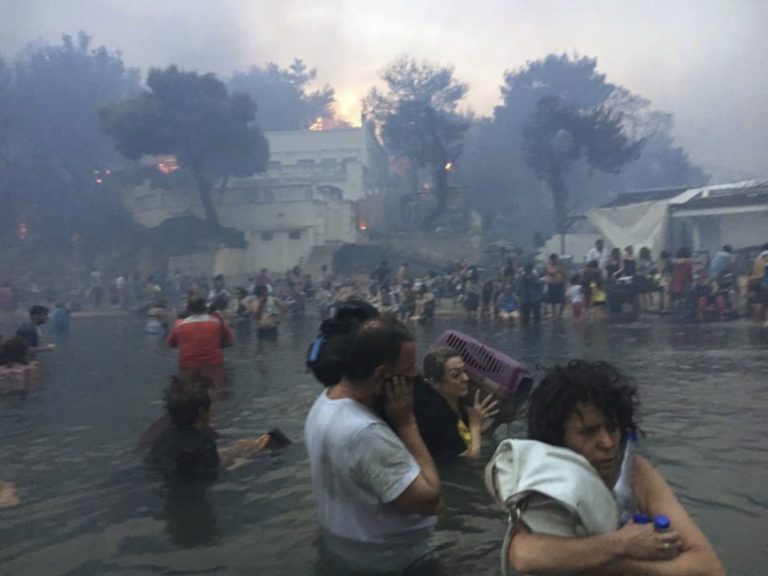
August, Greece: China’s Belt and Road Initiative includes Greece, when the Syriza Government announces it is formally joining.
August, Australia: PM Malcolm Turnbull steps aside for Scott Morrison to take over as prime minister, after an unsuccessful right-wing challenge to Turnbull’s leadership.
Jan- Ongoing, Global: #MeToo Movement goes Global except for in Greece. Official reports show that the Greek public feels positively about their country’s achievements in the gender equality realm. Greeks are the second most confident EU citizens in that respect. The #MeToo movement took off in the United States last year in the wake of the 2017 sexual abuse allegations against Hollywood producer Harvey Weinstein. The movement goes global as millions came forward to share their stories, in Italy #QuellaVoltaChe, in Spain it is #YoTambien, in France it is #BalanceTonPorc, and in Arab-speaking countries it is #AnaKaman. The precise form the #MeToo movement has taken and the success it has achieved have varied across countries and regions as legal, political, economic, and cultural conditions have differed. China, Russia, and sub-Saharan Africa are among the places where the effort to highlight and end sexual abuse and harassment hasn’t taken off.
August, Greece/USA: Astrophysicists, Olga Malandraki of the National Observatory of Athens, Angelos Vourlidas from Johns Hopkins University and Athanasios Couloumbakos, from the Institute of Research, Astrophysics and Planetology in Toulouse, France take part in NASA’s Parker Solar Probe spacecraft mission, launched to study the sun more closely than ever before.
October, London/Greece: Dimitris Papaioannou, contemporary Greek choreographer, presents The Great Tamer which delves into ancient myth for his visionary piece fragmenting the human experience in Salders Wells, London. The program is presented over 500 shows across Europe, North America and Australia.

2019
February, Australia: The Banking Royal Commission Report is Released exposing systemic wrongdoing in Australia’s financial sector. Public hearings shock the country and wipe more than AUD$60 billion (USD$43.4 billion) from financial stocks as investors factor in tougher regulation, higher compliance costs and thinner margins.
March, Australia: Cardinal George Pell is sentenced to jail for sexually abusing two choirboys when he was Catholic archbishop of Melbourne in the 1990s.
March, Australia: Archbishop Stylianos dies from cancer on 25th of March. The Primate of the Greek Orthodox Archdiocese of Australia serving the Greek Orthodox Archdiocese of Australia for 44 years. The Archbishop was a theologian as well as an award-winning poet. The controversial and at times divisive figure in his support for conservative values and often his authoritarian stewardship of the Archdiocese, such as not allowing personal eulogies in the church at funerals, being-LGBTIQ rights, and strained relations with secular Greek Communities. He was always larger than life. He oversaw the expansion of the Greek Orthodox Archdiocese, and played a pivetal role in the reconciliation between the Greek Orthodox Community of Melbourne, Victoria and the Archdiocese. The South Australian Greek Orthodox Community maintains its position as the first state in 1956 to resist enforced clerical oversight from the Archdiocese.
April, Australia: Evzones arrive in Adelaide for Anzac Day. The Hellenic Presidential Guard were welcomed in Adelaide by Premier of South Australia, Steven Marshall as part of Anzac Day Commemorations, 25th April. They took part in the Dawn Service at the City of West Torrens Memorial Grounds. The Presidential Guard marched as part of the Anzac Day Parade through the streets of Adelaide. Adelaide was the only Australian state to be graced with the presence of Evzones as part of Anzac services
May, India: Prime Minister Narendra Modi, head of the Hindu nationalist Bharatiya Janata Party (BJP), wins for a second term when India, the world’s most populous democracy went to the poll.
May, Australia: Prime Minister Scott Morrison wins a third three-year term against the Labor opposition Australian Federal Election led by Opposition Leader Bill Shorten. Against all expectation by media Scott Morrison convincingly beats Shorten and the ALP. Critics of the ALP campaign highlight the complex array of messages, a fear of new taxes and the ALP’s pitch towards inner city Melbourne and Sydney, at the expense of Queensland.
June- July, France: Women’s World Cup is held in France. USA retains the title. Runners-up in only their second appearance in the competition, the Netherlands continue to make history of their own, while Sweden claims a top-three finish for the fourth time.
July, GB: Boris Johnson takes over as Minister after Teresa May steps down. He enters office with a paper-thin working parliamentary majority at a time of deep divisions within the country and in his own Conservative Party.
July, Greece: Kyriakos Mitsotakis becomes Greece’s new Prime Minister as head of conservative New Democracy. New Democracy secures 39.85% of the vote, with Mr Tsipras’s leftist Syriza party in second place with 31.53%
November, USA/Paris: US give formal notice to withdraw from 2015 Paris Agreement on climate change mitigation. It takes 12 months to take effect – the earliest possible effective withdrawal date by the United States cannot be before November 4, 2020,
November, PRC: More than a million Uighur Muslims are arbitrarily detained in China’s Xinjiang Province. The re-education camps are just one part of the government’s crackdown on Uighurs.